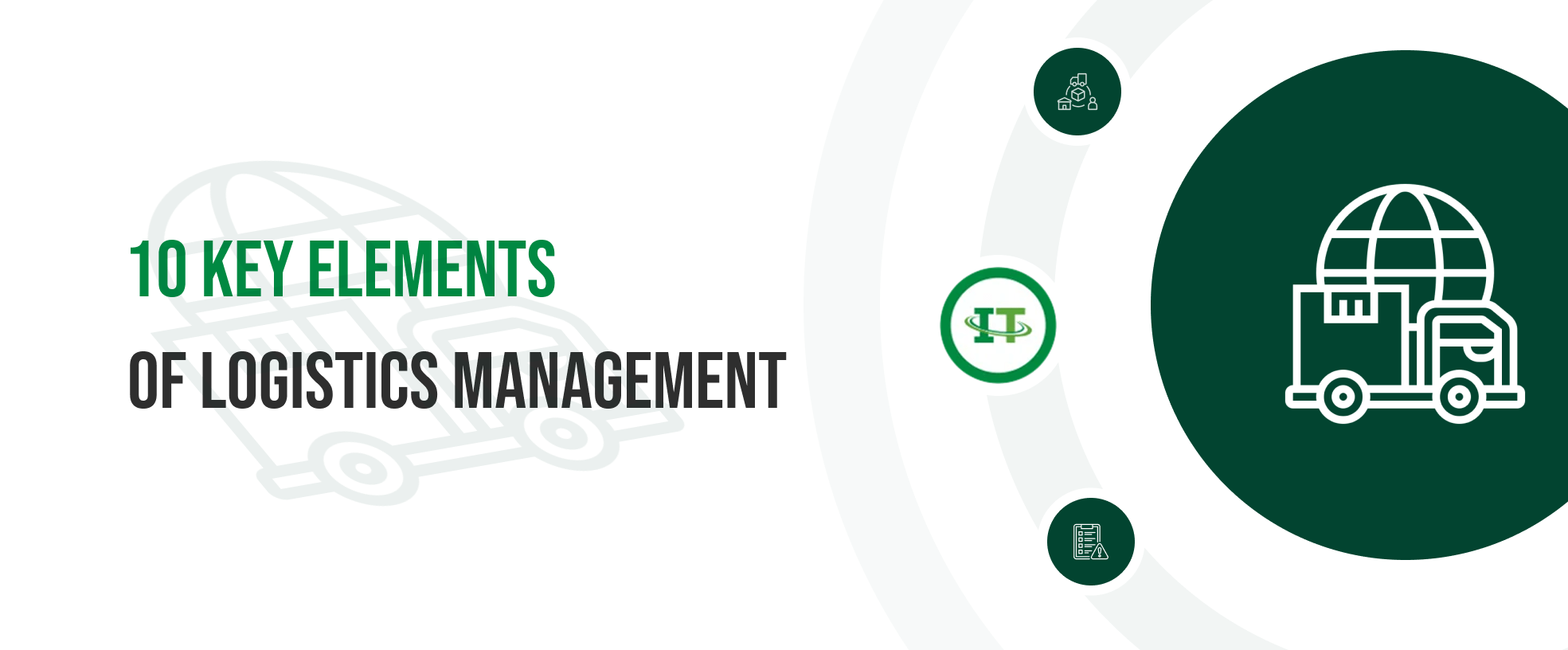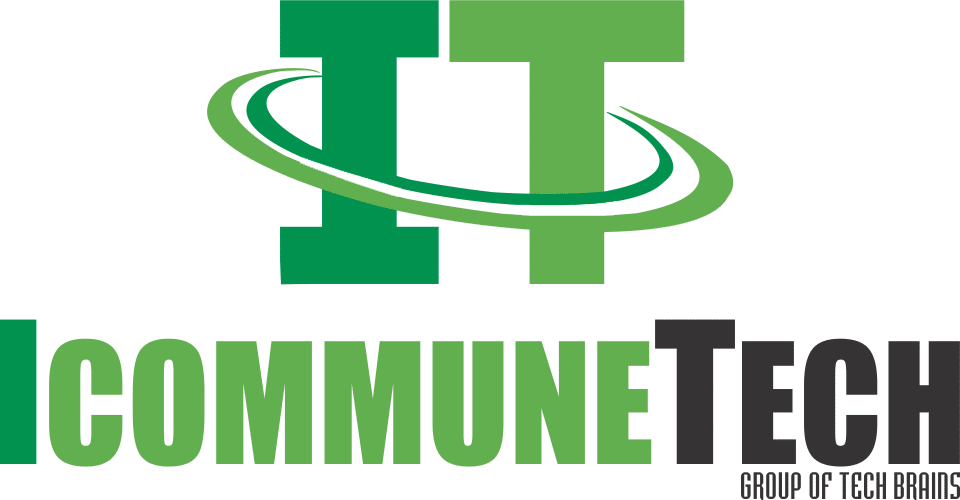What Are The 10 Key Elements of Logistics Management?

Do you know the key elements of logistics management that drive efficiency and enhance productivity? Dive in and get to know the driving force behind supply chains.
Think of logistics management as a fuel that drives the supply chain forward. It completes all the supply chain activities, whether storing, handling, inventory management, packaging, or more, at cost-effective rates. Here, we will discuss all the key elements of logistics management.
What Will We Cover?
- Top 10 Elements of Logistics Management
- 1. Information Flow
- 2. Material Flow
- 3. Customer Service
- 4. Infrastructure
- 5. Financial Flow
- 6. Technology Systems
- 7. Lead Time Management
- 8. Sourcing Strategy
- 9. Risk Management
- 10. Compliance & Regulations
Let us quickly understand what logistics management is, before understanding its key elements.
Logistics management basically means managing the transportation of goods from the provider to the customer. It focuses more on timely deliveries, end-to-end visibility, and strategic planning, throughout the supply chain process.
Now, let’s check out the important logistics management elements!
10 Important Elements of Logistics Management
Logistics management has several interconnected elements. These elements ensure speed, precision, efficiency, and cost savings. When appropriately managed, these elements can lead to complete logistics success.
Here are the important and interconnected elements of logistics management that make smooth-running and successful supply chains:
1. Information Flow
Effective logistics means exchanging data and information across warehouses, distributors, and suppliers. Hence, it is an important element of logistics management. With a good information flow, teams can track shipments, forecast demands, and plan routes. This results in better supply chain visibility and a high level of coordination.
A robust information flow is helpful in many ways. It helps companies track supplies en route, plan an optimized delivery route, and reduce disruptions in the supply chain. Good transparency helps in better accountability, reduces errors, and improves efficiency. Information flow can give you a competitive advantage in the fast-paced logistics era.
Example:A centralized ERP system helps monitor the deliveries and stock levels.
2. Material Flow
Material flows refer to the movement of raw materials, finished goods, and other components throughout the supply chain. A smooth flow of materials prevents delays and hassles, and a well-planned supply chain reduces the bottlenecks associated with the material flow at every stage.
Whether dispatching supplies, warehousing, internal transfers, or delivering to customers, material flow must be coordinated to prevent stockouts and understocks. Leveraging warehouse automation , real-time tracking, and inventory management results in smoother material flow.
Example: Optimizing the warehouse layouts that can reduce loading and unloading times and result in better material flow.
Did you know? As per Deloitte’s report[1], “Exploring the industrial metaverse” showed that 21% of surveyed companies were using metaverse technologies to optimize and enhance their supply chains.
3. Customer Service
Customer satisfaction is based mainly on timely delivery. Customers look forward to getting their supplies on time and in good condition. One element of logistics management ensures that goods are delivered to the customers in excellent condition. This builds brand image and reputation.
A responsive logistics system can adapt to changing customer requirements. Superior logistics-driven customer service has an edge. Supplies can be tracked by leveraging the features of logistics software , like real-time tracking, which results in satisfied customers.
Example:A retail or online company using logistics management software for real-time tracking of the order.
4. Infrastructure
A strong infrastructure is the foundation of a good supply chain. It includes warehouses, transportation networks, fulfillment centers, and more. A well-integrated infrastructure ensures supplies reach their destination without hassles and delays. It also supports better inventory management and quicker order fulfillment.
Access to advanced technologies increases flexibility and scalability. Companies partner with 3PLs to extend their reach and tap larger transportation networks to meet customers’ growing demand.
Example:Collaborating with third-party logistics helps businesses to have better transportation networks.
5. Financial Flow
Managing the financial side, such as invoicing, payment processing, budgeting, and cost control, helps ensure profitability and better transparency. Financial flow includes several activities, such as budgeting, invoicing, cost control, on-time deliveries, etc. Transparency in financial transactions minimizes errors and results in streamlined operations.
Example: Integrating the financial modules within the logistics software provides real-time insights into expenditures, helping businesses reap constant profits and make better strategic decisions.
Did you know? According to the report by Grand View Research [2], the worldwide warehousing industry is projected to reach a revenue of US$1,726 billion by 2030, growing at a CAGR of 8.1% from 2025 to 2030.
6. Technology Systems
Modern logistics depends mainly on the latest technology to streamline business operations. Tools include Warehouse Management Systems, Transportation Management Systems, and Enterprise Resource Planning for better visibility, data analytics, and automation.
These technology systems help businesses manage inventory, optimize real-time routes, and track shipments. Integrating IoT, AI, and several cloud-based logistics platforms increases supply chain connectivity, which means fewer errors and better efficiency.
Example: A retail company that uses AI-enabled TMS to plan delivery routes based on weather and traffic conditions. This leads to cost savings.
Get CommuteLogix – Logistics Management Software!7. Lead Time Management
Lead time management means controlling the time between placing and completing an order. Efficient lead time management minimizes delays, avoids stockouts, improves inventory turnover, and more, which means happier and more satisfied customers.
Optimizing the lead times results in better planning, supply chain responsiveness, and customer trust.
Example: Implementing JIT or Just In Time Inventory systems brings down the storage costs to a great extent.
8. Sourcing Strategy
A well-defined sourcing strategy helps businesses cut costs, improve quality, and speed up delivery. Choosing appropriate sourcing models and the right suppliers ensures that products are consistently available without compromising budget or performance.
Strategic sourcing helps build long-term client relations, negotiate terms, and assess risks. The approach of sourcing strategy leads to better flexibility and a strengthened supply chain.
Example: For instance, when a U.S.-based electronics manufacturer that was once reliant on suppliers from India spots a nearshoring sourcing strategy, it greatly reduces lead times.
9. Risk Management
Logistics operations are prone to market risks such as natural disasters, labor strikes, cyber threats, and geopolitical issues. A strong risk management strategy helps identify potential threats, develop a contingency plan, and locate potential disruptions, if any. Businesses’ proactive approach significantly reduces downtime.
Risk assessments should be done regularly, and mitigation measures should be ready. Mitigation measures include safety protocols, insurance coverage, and back-up logistics that should be in place.
Example: Some risk management strategies include maintaining alternate delivery routes and relations with secondary suppliers.
10. Compliance & Regulations
Compliance with local, international, and national regulations is important for maintaining ethical logistics operations. Non-compliance can result in delays, penalties, and damage to service providers’ reputations.
The logistics manager should use good logistics management software to stay informed about the latest rules and regulations and train the staff to comply with them, too.
Example: A global shipping company ensures its freight follows the latest shipping standards, documentation accuracy, and environmental laws.
Final Thoughts
In short, logistics management is a multi-tiered process that entails strategic thinking and implementation. Mastering the key elements of logistics management results in greater efficiency, precision, and speed. Companies that want a better market reputation and satisfied customers cannot afford to ignore good logistics management technology.
Key Takeaways:
- Logistics management involves planning, executing, and managing supplies from the point they enter the market until they reach the customers.
- Several components of logistics management, such as material flow and information flow, help improve supply chain efficiency.
- Information flow in real-time and a strong infrastructure are significant
- Using the technology and preparing for the risks gives a clear-cut advantage.
- Great logistics leads to a high customer satisfaction rate.
Frequently Asked Questions (FAQs)
Whatever your questions, just let us know today. We have answered some of the top questions here to satisfy your needs.
1. What is Logistics Management?
In simple words, logistics management is all about planning, execution, and management of supplies from the time they enter the supply chain until they reach the customers. It is storing, transporting, tracking, dispatching, and every other supply chain activity.
2. What are the benefits of effective Logistics Management?
There are a couple of benefits of effective logistics management , such as cost reduction, improved customer satisfaction rate, efficiency, and more. These advantages help businesses retain their customers, improve efficiency, and save costs.
3. What is the green component of Logistics Management?
The green component of logistics management means using sustainable methods for various logistics activities, such as picking, packing, transportation, etc. This has resulted in green logistics gaining immense popularity recently.
4. What are the functions of Logistics Management?
Logistics management serves multiple functions: warehousing, order processing, inventory management, transportation, and customer services.
5. How do you do logistics management effectively?
Managing logistics effectively begins with determining your goals, then implementing a strategy, leveraging technology, training employees, etc. These are just a few practical steps for executing logistics.
Drive-in Efficiency, Better Productivity, and Profits With iCommunTech!
iCommuneTech is the market leader that has helped logistics companies meet their business goals, drive efficiency, and achieve continual profits. Whether you need to stay ahead with automation, want an end-to-end logistics solution, or anything else, get in touch today!
iCommuneTech is rated high because of its trusted software, CommuteLogix. Contact us for better logistics operations!
Irshad Pathan

Web Development Expert
Irshad is a senior technical expert at iCommuneTech. He manages the iCommuneTech's Web Development Team, and has hands-on expertise in web development, Laravel development, Logistics, fleet management, and Supply Chain Management. He mentors the in-house team and enjoys describing his experience in words.
Read More Insights By Irshad →